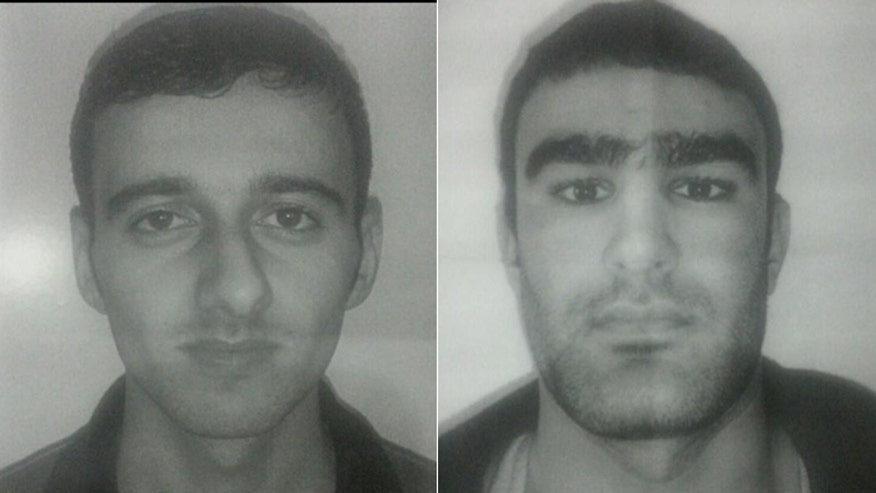'I would kill you': ISIS captive held by Kurds admits taking 70 lives
http://www.foxnews.com/world/2014/12/12/would-kill-isis-captive-held-by-kurds-admits-taking-70-lives/

“Omar, “ a 25-year-old former Islamic State fighter from the Iraqi village of Dor sal-hadeen, said he killed scores of his countrymen and foreign contractors after joining “Daesh,” as ISIS is known in the region, in June. He said he fled the terrorist army in October, but was quickly captured by Kurdish security forces.
“They came to our area and forced me to protect their lands,” Omar said of his Islamic State commanders. “After a while they told me, ‘When are you going to start protecting your own land?’
“They told me to do it or die, and then they killed people in front of me,” said Omar, who is missing four fingers on his left hand from what he said was a 2009 industrial accident. The disability nearly got him killed by his ISIS handlers, he said, until he proved he could shoot right-handed.
Omar is currently being held in an undisclosed prison in Sulymaniyah, after being convicted of terrorism. He was initially sentenced to death, but a judge commuted the sentence to life in prison.
Face to face with ISIS
FoxNews.com's Hollie McKay last month traveled to Kurdish-administered territory in Iraq's Sulymaniyah province, where she met face-to-face with two imprisoned ex-Islamic State soldiers. The interviews were conducted over the course of several hours, and took place in an office at Sulymaniyah’s “Asaih,” or security facility, in the presence of a Kurdish colonel and an independent Kurdish translator. No questions were off-limits for the prisoners, who appeared in civilian clothes, and were not handcuffed or shackled. Asaish officials provided mug shots of the men, but as a condition of the interview insisted FoxNews.com not use their full names.-------------------------------------------------------------------------------------------------------------------
But victim or not, Omar said he became a prolific killer for ISIS, by his count racking up 70 executions in a matter of months. He claimed he killed his victims with rifle shots, and was chillingly candid about why he did it.
“Because they were saying bad words about A'isha [one of Mohammad’s wives, known as the “mother of believers”] and burning a mosque,” he said, adding that he did not receive any type of reward from ISIS leaders for the large number he killed.
Asked if he felt remorse, Omar replied said he “did not act on my own will.” That claim drew a sharp rebuke from the commander of the facility's department of investigation, prompting Omar to say he deflected blame because he was uncomfortable around women.
Omar and other hundreds of other former ISIS soldiers and deserters are being interrogated for intelligence that may help the Kurdish Peshmerga army in its fight against the jihadist group. Kurdish officials say the men are being held under conditions in adherence to international law and monitored by the Red Cross.
Evidence against individual former combatants is gathered and presented to a Kurdish judge, who decides whether prisoners are held or released, according to the Kurdish commander who sat in the interview, and did not allow his name to be used. Omar and many other ex-ISIS fighters convicted of mass murder or terrorism charges may well spend the rest of their lives in prison. Other ex-ISIS fighters judged to be non-terrorists will serve lesser sentences, or will be released among the general population.
At another point in the interview, Omar said he joined ISIS to get away from his new bride. Saying she had “something in her head – she looked normal on the outside, but she wasn’t,” Omar added that his wife “couldn’t have babies.” He then acknowledged, with a shrug, that by fleeing to join the murderous jihadi army he left his family responsible for paying his wife’s family a fortune.
“I would call you to Islam and if you did not come I would kill you.”- "Omar," ISIS fighter held by KurdsOmar said he deserted ISIS and fled to Kurdistan in an attempt to blend in and find work, but was arrested by police on Oct. 8, after being identified by Kurdish intelligence agents.
Although he said at times that he wished to take up arms with the Iraqi military or the Kurds, there were several instances in which Omar used the pronoun for “we” when discussing Daesh, a possible giveaway of his true sentiments toward non-believers in general, and Americans in particular.
“We count Americans like Jews,” he said at one point in the interview. He had similarly hostile views of Western women.
Asked what he would do if he saw his female interviewer on the street, he replied, “I would call you to Islam and if you didn’t, I would leave you alone.” Pressed, he corrected himself. “I would call you to Islam and if you did not come, I would kill you.”
Omar was one of two former Islamic State fighters who spoke to FoxNews.com at the Asaish facility, where terrorists are held with local criminals. The other, a 19-year-old Kurd identified as "Dawen," said he was lured to join by the group’s Facebook pages, which urged Muslims to come fight in Syria.
Dawen said he spent just 20 days in the world’s most infamous terrorist army before being arrested two months ago. He said he did not witness any killings, but had no illusions about Islamic State’s barbarity.
“I realized that this is not about God, especially after I was captured,” he said. “I realize this isn’t about God; it is about harming people. Also, the Kurdish people were nice even with my situation.”
Dawen said he felt regret about joining the group almost immediately. “I called my family and they were not happy, it was shameful… I felt weak because they made me act and think a certain way,” he said, when asked whether joining a terrorist organization made him feel powerful. “I was asking for forgiveness, even while there.”
Dawen, who faces terrorism charges, also insisted he is learning more from fellow inmates about other barbarities committed by ISIS, and suggested Kurdish officials “make anti-terror shows and programs” to teach others that this is “not the way to be.”
The facility's director of security said most ISIS fighters are uneducated, and easily led down the bloody path of violent jihad.
“Some regret their actions, some do not,” he said. “Understand that most are young and have no information. They are impressionable. They listen to the second-life paradise story, 72 virgins, rivers of wine, and [staying] young forever. That is all they know.”
Unlike prisoners of ISIS, many of whom have been marched into the desert and executed, or garbed in orange jumpsuits and forced to kneel before being beheaded, deserters and captives from the terrorist army say they are treated well by Kurdish authorities. The two men interviewed by FoxNews.com were dressed comfortably, clean-shaven, appeared well-nourished and showed no signs of physical injury or abuse.
Both men confirmed they are allowed phone contact with family members, and seemed aware of recent news events involving ISIS. Both said they feared being captured by ISIS if released.
Security officers, however, cautioned against believing the prisoners’ expressions of remorse. Both men told FoxNews.com they wanted to join the Peshmerga, the Kurdish army that has won back much of the Iraqi and Syrian land seized by ISIS. But Kurdish officials said neither man could be trusted, noting ISIS has been known to send spies into Kurdistan.
Kurdish officials privately predicted there was little doubt the two men, and others like them, would be back fighting for ISIS within days if they were ever freed.
Referring to former Iraqi leader Saddam Hussein’s repeated and destructive campaigns against the Kurds, the official noted they have extensive experience handling such threats.
“We have been dealing with terrorist groups since the beginning, so this is not new for us. We specialize in terrorists.”
Mylee Cardenas contributed to this report







































No comments:
Post a Comment